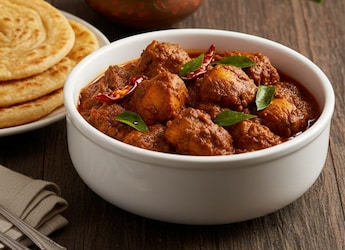In India, we have a longstanding culinary tradition of using desi ghee. There are also many other options for cooking oils available out there. Oil bottles tend to have several different and seemingly complicated labels that we don't always understand. Moreover, we are often not sure which ones to choose and how to use them in the healthiest way. In the northern and eastern states of the country, mustard oil has been a traditional choice. Today, it is still widely used throughout the country for cooking many types of food. We asked consultant nutritionist Rupali Datta to weigh in on the ghee versus mustard oil debate. Here's what you need to know:
Also Read: 7 Healthy Carb Sources That You Must Include In Your Diet
Ghee Or Mustard Oil - Which Is Healthier?
Mustard oil lends a distinctive taste to food and is widely used especially in northern and eastern Indian states. Photo Credit: iStock
Rupali Datta states, "Mustard oil is said to be healthier than ghee because it stands out in terms of its fatty acids profile." Mustard oil has almost double the quantity of monounsaturated fats than ghee. Additionally, this oil contains more polyunsaturated fats. It is important to note that both these types of fats can greatly benefit your body. However, it is saturated fats that pose a health risk and around 60-70% of desi ghee is made up of this kind. According to the nutritionist, recent studies suggest that saturated fats can have a worse impact on heart health than dietary cholesterol. Hence, we cannot afford to ignore their presence in our daily diet. But does this mean you should completely abandon ghee and switch to mustard oil? Unfortunately, the answer is not that simple. Continue reading to discover the best ways to use cooking oils:
Also Read: Want A Healthy Heart? These 4 Diets Are A Must-Try
Ghee Versus Mustard Oil - Which Should Be Used For Deep Frying?
You should never use oils with a low smoking point for deep frying food. Photo Credit: iStock
Remember that the consumption of deep-fried food, irrespective of the oil used, needs to be moderated. According to experts, it is advisable to choose ghee over mustard oil for deep frying, since it has a slightly higher smoke point (approx 240 degrees C). The smoking points of oils are significant because they indicate their stability. Once the oil has been heated beyond its smoking point, it will start breaking down and can ruin the food being cooked in it. It can also harm your health. This is why oils with a low smoking point such as extra virgin olive oil should never be used for deep frying. In general, refined oil has a relatively high smoking point among other types. Hence, it is not a bad option. However, for purposes other than deep frying, the nutritionist does not recommend exclusive use of mustard oil. Find out more below.
Also Read: Gut Health: 5 Diet Tips To Improve Gut Bacteria, Given By A Nutritionist
Ghee Versus Mustard Oil - Which Is Better For Daily Cooking?
Experts suggest that combining different types of oil can give you maximum benefits, when done right. Photo Credit: iStock
The answer is both - and other oils too! According to Rupali Datta, the healthiest way to use oil for cooking is to opt for a combination of different types. In its Manual of 'Dietary Guideline For Indians,' here is what the National Institution Of Nutrition recommends:
- Groundnut or Sesame or Rice bran + Mustard
- Groundnut or Sesame or Rice bran + Canola
- Groundnut or Sesame or Rice bran + Soyabean
- Palmolein + Soyabean
- Safflower or Sunflower + Palmolein + Mustard
This is to ensure a good balance of fatty acids that are required by your body. According to Rupali Datta, it is alright to add a small quantity of ghee to these combinations. But note that the total recommended intake of cooking oil per person per month is 500 grams - and this would include your ghee consumption. Another point to keep in mind: certain types of desi ghee available in the market may be adulterated with vanaspati ghee, which is high in trans-fat. This type of fat can have a detrimental effect on your health. Hence, you need to check the contents of the ghee before buying and favour trusted sources.
Also Read: Feeling Hungry All The Time? Here's What To Do About Food Cravings
Is Refined Mustard Oil Healthy?
Ultra-processed commercial oils do not contain most of the nutrients of their base ingredients. Photo Credit: iStock
According to Rupali Datta, cold-pressed oils (also sometimes called "kachi ghani" oils) have a range of benefits as they are unrefined. This allows them to retain healthy fatty acids, vitamins and other nutrients. However, they have a low smoking point and hence cannot be used for cooking at high temperatures. Moreover, it is not always practical to invest in them as they need to be carefully sourced as well as stored. She recommends buying small quantities of cold-pressed mustard oil, if possible. You need to store it in a cool place and use it in the combination of oils mentioned earlier.
For practical reasons, one often has no choice but to use commercial oils. Unfortunately, most of these are ultra-processed, which strips them of their antioxidant, vitamin and mineral content. However, some refined oils may still retain their fatty acid profile, which can be useful, says the nutritionist. Above all, beware of your consumption of trans fat and saturated fats.
Also Read: Fact Check: 5 Popular Myths About Healthy Food That You May Still Think Is True
Disclaimer: This content including advice provides generic information only. It is in no way a substitute for a qualified medical opinion. Always consult a specialist or your own doctor for more information. NDTV does not claim responsibility for this information.
